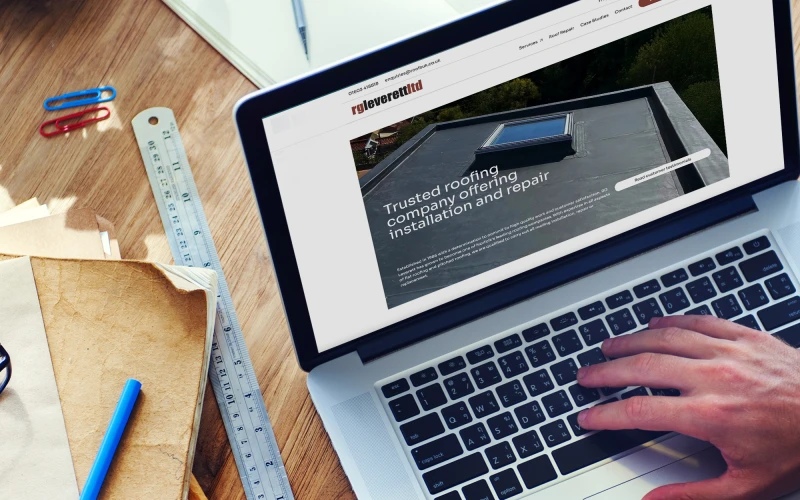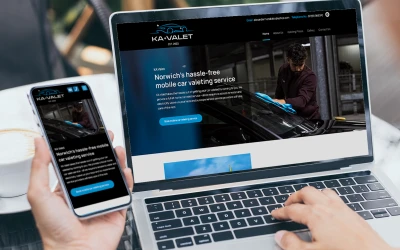
Let’s face it - building a website isn’t just about throwing some pretty pictures onto a screen and calling it a day. It’s about making something that works - for your business, your customers, and your goals. But if you’ve started Googling how to get a website live, you’ve probably come across this familiar fork in the road:
Do I use a platform like Wix or Squarespace, or should I pay a web designer or developer to build something for me?
It’s a fair question. And there’s no one-size-fits-all answer. It really depends on where you’re at, what you need, and what you’re hoping to get out of your website.
So let’s break it down.
The DIY Website Builders: Wix & Squarespace
Wix and Squarespace are two of the biggest players in the world of drag-and-drop website builders. They’re designed to be simple, fast, and accessible - which is a big part of their appeal.
Here’s what they offer (and where they fall short):
The Pros
- Easy to Use: No coding. No complicated setup. You just pick a template and start editing. If you’re reasonably comfortable with tech, you can get something basic live within a few hours.
- All-in-One Setup: Hosting, SSL certificates, updates - it’s all bundled in. No need to worry about plugin conflicts or server issues.
- Low Upfront Cost: For small businesses or side projects, the monthly subscription feels manageable (usually £10-£25 per month).
- Nice-Looking Templates: Especially with Squarespace, the visual polish is there straight out of the box.
The Cons
- Limited Flexibility: What you see is what you get. If you want to change the layout or add custom functionality, you’re restricted to what the platform allows.
- SEO Limitations: While both platforms have improved, they’re still not quite on par with a properly built WordPress or custom site when it comes to technical SEO.
- Template Fatigue: You might notice that lots of Wix and Squarespace websites look the same. Because they are. There’s only so far you can go with “customisation” before it feels templated.
- Performance Can Lag: Sites built on these platforms can feel sluggish, especially on mobile or with image-heavy designs.
- Ownership & Portability: You don’t fully “own” your website. Want to move it somewhere? Tough luck - you’re starting from scratch.
So… When Is Wix or Squarespace the Right Choice?
Honestly? These platforms are great for:
- Personal portfolios
- Simple brochure sites for startups or sole traders
- Quick landing pages
- Temporary event websites
- DIYers who are just getting started and want something live fast.
If you’re not quite ready to invest and just need an online presence, they do the job.
But if your site is core to your business - if you rely on it for leads, bookings, sales, or credibility - you’ll soon hit the ceiling.
The Case for Hiring a Web Developer or Designer
Now let’s talk about the custom route - working with a professional to build your website. This could be a freelancer, an agency, or someone offering monthly web packages - like us.
Here’s why people go down this path:
The Pros
- Tailored to Your Business: Your website is built around you. Your goals, your audience, your branding - not someone else’s template.
- Scalable & Future Proof: A good developer won’t just build for today. They’ll think about how your business might grow and make sure the site can evolve with you.
- Better Performance & SEO: Speed, structure, user experience, search optimisation - all the stuff that happens under the bonnet is handled properly.
- Functionality Without Limits: Need a booking system? Member logins? A clever calculator or quote tool? A developer can build it (or integrate the right thing securely).
- Ongoing Support: Instead of scrambling when something breaks or needs updating, you’ve got someone in your corner.
The Cons
- Higher Upfront Cost: You’ll pay more than £10/month, that’s for sure. Depending on the scope, a good small business site can start from a few hundred to several thousand pounds.
- Longer Timelines: You won’t have something up by the weekend. A well-built site takes time - for strategy, design, build, and testing.
- You Need to Trust Your Developer: Like any professional service, the experience depends on who you hire. You need someone who listens, communicates well, and understands your goals.
So When Should You Hire a Web Pro?
This route is probably best if:
- Your website is vital to how you make money
- You need your site to reflect your professionalism and brand
- You want flexibility, scalability, and control over your content
- You want someone else to deal with the tech stuff
- You’ve outgrown a DIY site and want something more robust
It’s not just having a site that looks good - it’s about having one that performs well, ranks, converts visitors, and gives your customers a great experience.
Why Not Both?
There’s also a middle ground. Some web designers, like us, offer monthly website packages - which blend the quality of a developer build with the flexibility of an affordable monthly plan.
That means:
- No big upfront investment
- You still get a professional, strategic build
- Ongoing support, updates and tweaks are all included
- Your site evolves as your business does
It’s like having your own in-house web team - without the salary bill.
Final Thoughts; Know Where You’re Headed
Wix and Squarespace are brilliant for getting something up and running. No shame in starting there. But they’re not always where you finish.
Hiring a developer is an investment - in your business, your brand, and your ability to scale online.
So if your website is just “something to have,” the DIY route is fine. But if your website is your shop window, your lead generator, your booking system, or your digital sales team - it’s worth getting it built properly.
And if you’re not sure where you sit? Just ask. We’re always happy to have a no-pressure chat and help you figure out what’s best for where you are right now.
Because it’s not about selling you something you don’t need - it’s about making sure your website works as hard for your business as you do.


